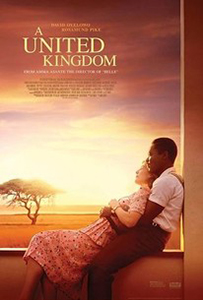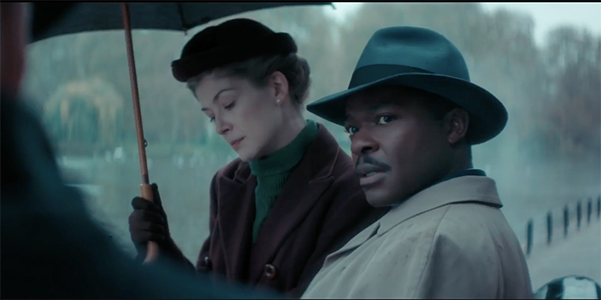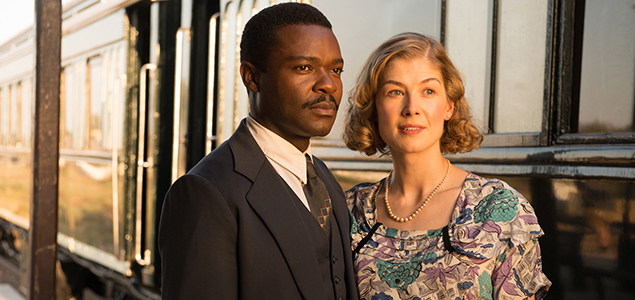Behold the fabled Prestige Film! There are some for whom this hook is repellant: the worm dangling like a flaccid organ, poised to ejaculate manipulative emotion like award-attracting pheromones. Look at the pretty British actors! Playing people who were significantly less pretty in real life! Sprinkle contrivance and season the historical record with Hollywood tropes, and ta-dah! FOR YOUR CONSIDERATION.
“A United Kingdom” is exactly that kind of movie. It wants your tears; it demands your tears. Tears make it strong! Tears win Golden Globes and earn Academy Award nominations! After all, you know the studios don’t produce Prestige Films to make money, right? This is very callous, and very cynical. What separates “A United Kingdom” from its counterparts, all of which are united in their aim to appear important, is that right now, this one actually kind of is.
Bearing the often dubious “based on a true story” disclaimer, “A United Kingdom” tells the story of Seretse Khama (David Oyelowo), Prince of Bechuanland, and his unprecedented interracial marriage to London typist Ruth Williams (Rosamund Pike). Being just a few years out from World War II, this doesn’t sit well with the conjoined governments of South Africa and Great Britain, and neither family is exactly doing backflips either. Resisting the overwhelming pressures of social unrest and racial intolerance, both Seretse and Ruth struggle to make their marital union an example, and to gain independence for South Africa despite the best, or worst, efforts of sneering, arrogant British character actors like Jack Davenport and Tom Felton. As we all know, British people are evil.
Strike the last comment; retain the sentiment and substitute your current political dictator of choice. “A United Kingdom” is a social mirror film in every way, in that the screen on which the film is projected reflects our current image in a way that can trouble or inspire. Given a current U.S. political climate in which racial tensions are exacerbated, foreign affairs and immigration are hot button topics, and the fact that our leaders may or may not be lying to us (but definitely are), the film’s message is one that serves both to warn and to offer hope. Love, we’re told, can defy color, culture, and nationalism, and can ultimately build or reshape civilization as we know it.
If you’re rolling your eyes, I get it. Films of this sort tend to make their point with all the grace and subtlety of a jackhammer falling from the precipitous heights of the Hollywood sign. “A United Kingdom” is told via a Guy Hibbert screenplay that hits all the typical biopic notes, slipping often into well-worn fairy tale territory (the people of Bechuanland refuse to accept Rose until she carries pails of water alongside them, after which they acknowledge her as queen; her bigoted English parents have a predictable change of heart after seeing their daughter’s impassioned public shaming of Churchill in a theatrical newsreel, etc.), but the cast sells it. Oyelowo in particular adds gravitas, avoiding the dangerous face plant onto maudlin flypaper. Saddled with not one but two big speeches in which he rallies his divided tribe, he nails both. And both work, even when the first is followed by the familiar slow clap moment in which, one by one, his disaffected audience stands to support him as Patrick Doyle’s orchestral swelling reaches climax. Its cheese, but damn it, it’s good cheese, and it’s honest cheese. It’s cheese we might actually need a little more of.
Director Amma Asante brings a level of class and authenticity to what might otherwise feel like a TV Movie of the Week; her sense of narrative pacing and visual camerawork are elegant. The London streets are a dark, foggy, sunless bastion of white authority (on the nose!); The African landscapes, conversely, are vibrant and explode with color (even more on the nose!). Only a scene in which digital sky replacement has been clumsily employed diminishes the effectiveness of the location shooting (for which I’m certain “Star Wars” prequel trilogy producer Rick McCallum, also at work here, is to blame). Having this material gracefully expedited by a woman of color is a welcome and notable attribute that shouldn’t be underestimated.
Full disclosure: I hate this kind of movie. These types of films are so often “Downtown Abbey” with a self-proclaimed sense of importance, which is both unearned and disingenuous. The transparency reveals the ghoulish, accolade-hungry producers behind the image, squeezing out putrid, po-faced art films between blockbusters, and giving white people the opportunity to feel woke. Entertainment is all about manipulation, but when you dress up an important truth in lipstick and rouge, it can feel a lot like prostituting a toddler. Yet for all my preconceived notions about what kind of film this would be, Asante made a point of reminding me that preconceived notions about films, or people, are bad things to have. Perhaps the secondary kingdoms we see successfully unified here are art and commerce.
So yeah, I cried. I admit it. “A United Kingdom” demanded my tears; it got them. As Seretse Khama said, “No man is free who is not master of himself.”
Directed by Amma Assante and Steven Hall
Written by Guy Hibbert
Rated PG-13 for some language including racial epithets and a scene of sensuality






Leave a Reply
You must be logged in to post a comment.